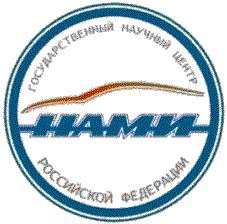Central Scientific Research Automobile and Automotive Engines Institute, NAMI
 NAMI, previously known as the scientific automobile laboratory NAL, was established in 1918. The laboratory was situated in the North-East of Moscow, near high technical and auto-armoured schools. In 1921, the Government of Russia transformed the laboratory into the Scientific Automobile and Automobile Engine Institute (NAMI). At the end of twenties, a complex of buildings and facilities was built occupying 16,5 hectares. Since 1931, the Institute has been renamed into the Scientific Autotractor Institute (NATl). After WW-II, the Tractor Institute became an autonomous organisation, known as NATl, but NAMI name was returned to the Central Automobile and Engine Research Institute. NAMI is one of the oldest R&D centres of Russia, and is engaged in a wide range of research work in the field of automotive industry, i.e. forecasting, fundamental research, design developments, production, tests and final improvement of automotive advanced samples and their components, including applied research activities for automobile works, related production capacities and foreign companies.
NAMI, previously known as the scientific automobile laboratory NAL, was established in 1918. The laboratory was situated in the North-East of Moscow, near high technical and auto-armoured schools. In 1921, the Government of Russia transformed the laboratory into the Scientific Automobile and Automobile Engine Institute (NAMI). At the end of twenties, a complex of buildings and facilities was built occupying 16,5 hectares. Since 1931, the Institute has been renamed into the Scientific Autotractor Institute (NATl). After WW-II, the Tractor Institute became an autonomous organisation, known as NATl, but NAMI name was returned to the Central Automobile and Engine Research Institute. NAMI is one of the oldest R&D centres of Russia, and is engaged in a wide range of research work in the field of automotive industry, i.e. forecasting, fundamental research, design developments, production, tests and final improvement of automotive advanced samples and their components, including applied research activities for automobile works, related production capacities and foreign companies. Nowadays NAMI, as the State Research Centre of Russia in the field of automotive equipment, solves problems of strategy development for the period 2010 - 2015, performs state control of the field course through standardization and certification system, develops theoretical basic principles produce new vehicles and engines on the basis of up-to-date technology "of full life cycle", taking into account future requirements on ecology and safety construction. In 2008, the NAMI team of almost 1100 employees included 2 academicians and 18 professors, 19 doctors of sciences, 169 candidates of sciences. The institute has high-tech facilities to solve complicated scientific-engineering problems, R&D instrumentation and its experimental production works launches specimens and small series of complete vehicles and their units.
Within the frame of Geneva Agreement Concerning the Adoption of Uniform Conditions of Approval and Reciprocal Recognition of Approval for Motor Vehicle Equipment and Parts the NAMI Institute was registered as Russian Administrative authority E22/A on certification of vehicles with responsibility for issuing «Type approval» documents for vehicles and their components, and coordinates activities of technical services directly involved in certification tests on compliance with ECE Regulations being the part of 1958 Agreement and 1998 Global Agreement. A number of leading specialists working at NAMI and Proving Ground, participate in the activities of Inland Transport Committee ECE UN, whereas Mr. Boris Kisulenko, NAMI Deputy of General Director, Member of Russia Engineer Academy and Academy of Transport, since 2004 in turn has been the President or the vice-President of the Working Party on the Construction of vehicles (WP 29) ECE UN.
The main task of NAMI are R&D in the field of engine equipment, to perform state control of the field course through standardisation and certification system, develops theoretical basic principles ensuring new and produce new engines on the basis of up-to-date technology "of full life cycle", taking into account future requirements on ecology and safety construction.



